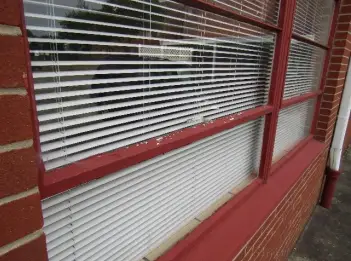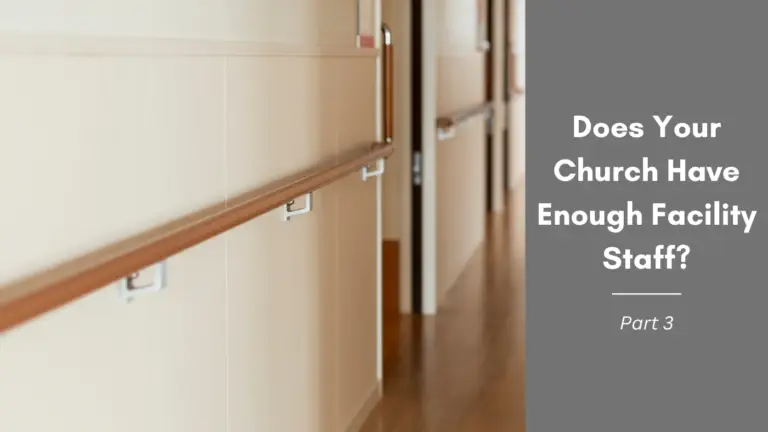In supporting your facility management and stewardship initiatives, it is essential to anticipate your needs. You do not want to be caught off guard, over and over. Your facilities are some of your church’s largest assets and budget line items.
But are you aware of how your church facilities are doing? Do you know the condition of your facilities at any given time? And how can you put that information to good use?
What Is A Facility Condition Assessment?
By definition, a Facilities Condition Assessment is the process of developing a comprehensive picture of physical conditions and the functional performance of buildings and infrastructure. It is analyzing the results of data collection and observations; and reporting and presenting findings.
According to the Association of Physical Plant Administrators, a trade organization focused on educational facilities, “the main objective of the facilities condition assessment is to measure the condition and functionality of buildings. Specific objectives of the comprehensive assessment methodology include determining needs for renewal or replacement of building and infrastructure systems ( heating/cooling, electrical, exterior envelope, etc.) and system components (cooling tower, heat exchanger, chiller, pumps, etc.), and guiding the analysis of good decision capital project options, including renovation or modernization.”
We have adopted much of this mindset at Smart Church Solutions into our Facility Condition Assessments. Through Facility Condition Assessments, we examine the physical condition of church facilities. We develop lists of deferred maintenance, review life safety matters and OSHA considerations, analyze the operational budget efficiencies, and consider the life cycle ramifications.
Our Take on Facility Condition Assessments
For us, assessing a facility is more than just observing the technical or analytical components. We take a slightly different approach than other companies when assessing the condition of “secular” use facilities. Church facilities have emotion and a kingdom purpose that requires more than a technical approach.
Therefore, our examinations include a fresh eyes/ first impression assessment, cost benchmarking, staffing levels, accounting of deferred maintenance, and life cycle projections.
Fresh Eyes Assessment
At the beginning of our assessment, we start with a fresh eyes observation. This includes walking the roof, the perimeter of the property, and accessible rooms.
We will report items that may be seen by your first-time guests that you may have gone numb to. Some popular examples include cracking in the parking lot, paint chipping, uneven slabs, stained carpet, and deferred maintenance.


We also like to look for OSHA requirements, ADA compliance, etc. With this information, we can also begin to document the deferred maintenance and capital reserve projections.
For our onsite visits, we typically take anywhere between 500-2,500 photos and videos to capture all needed components of the facility’s story.
Deferred Maintenance Snapshot
After our initial onsite visit, we take 2-3 weeks to help formulate the information further to get a true baseline of the property’s condition.
In our Facility Condition Assessment, we observe the deferred maintenance that needs attention immediately, along with what’s coming in 5 years, 10 years, and even 15 years out.

After we gather this information, we will also input it for you in our Life Cycle Calculator so you can further track the needed capital reserves for the years ahead.
Operational Benchmarking
The last major component of our Facility Condition Assessment includes operational benchmarking. We do this to ensure we do not just put a band-aid on the facility, but we fix the underlying roots.
We review what is being spent on general maintenance, utility expenses, staffing, capital reserves, custodial, etc to identify what you can do moving forward to prevent deferred maintenance.

One of the major reasons we see for preventative maintenance is a lack of staffing. For instance, you should have 1 full-time employee for every 35,000 square feet just for general maintenance…This does not include custodial or your facility manager.
Final Tidbit on Facility Condition Assessments
Facility Condition Assessments are not one-and-done. They are not a way to get leaders off your back. At the end of the day, facility conditions need to be seen as a tool. They are an ongoing guide for the future. Consider these critical elements when approaching a Facility Condition Assessment:
- A Facility Condition Assessment will provide great data. But,if you do not develop a plan to address the data, you have actually just wasted Kingdom dollars.
- FCAs should help change behavior. This includes how you budget, schedule work, plan facility utilization, consider technology, etc.
- They should help the church leaders understand the importance of facility stewardship and how to plan for the inevitable costs.
- FCAs will expose deferred maintenance items so that you can make a plan to address these issues to extend the life of your facility.
- An FCA should be performed regularly to identify improvements and raise new concerns.
We will be addressing the Facility Condition Assessment over the next several weeks in our blog. If you want to steward your facilities well, you will not want to miss any of these future posts.
See you next week!







